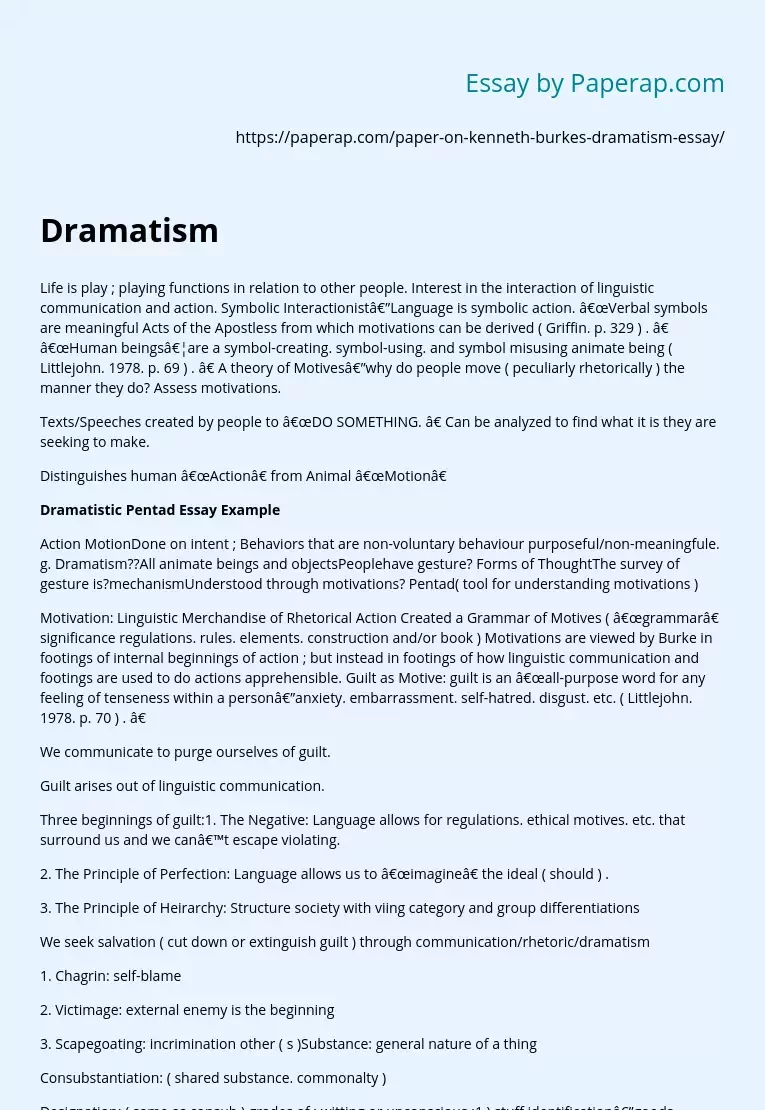Playful Communication and Interaction
Life is play ; playing functions in relation to other people. Interest in the interaction of linguistic communication and action. Symbolic Interactionist—Language is symbolic action. “Verbal symbols are meaningful Acts of the Apostless from which motivations can be derived ( Griffin. p. 329 ) . ” “Human beings…are a symbol-creating. symbol-using. and symbol misusing animate being ( Littlejohn. 1978. p. 69 ) . ” A theory of Motives—why do people move ( peculiarly rhetorically ) the manner they do? Assess motivations.
Texts/Speeches created by people to “DO SOMETHING. ” Can be analyzed to find what it is they are seeking to make.
Distinguishes human “Action” from Animal “Motion”
Dramatistic Pentad Essay Example
Action MotionDone on intent ; Behaviors that are non-voluntary behaviour purposeful/non-meaningfule. g. Dramatism??All animate beings and objectsPeoplehave gesture? Forms of ThoughtThe survey of gesture is?mechanismUnderstood through motivations? Pentad( tool for understanding motivations )
Motivation: Linguistic Merchandise of Rhetorical Action Created a Grammar of Motives ( “grammar” significance regulations. rules. elements. construction and/or book ) Motivations are viewed by Burke in footings of internal beginnings of action ; but instead in footings of how linguistic communication and footings are used to do actions apprehensible.
Guilt as Motive: guilt is an “all-purpose word for any feeling of tenseness within a person—anxiety. embarrassment. self-hatred. disgust. etc. ( Littlejohn. 1978. p. 70 ) . ”
We communicate to purge ourselves of guilt.
Guilt arises out of linguistic communication.
Three beginnings of guilt:1. The Negative: Language allows for regulations. ethical motives. etc. that surround us and we can’t escape violating.
2. The Principle of Perfection: Language allows us to “imagine” the ideal ( should ) .
3. The Principle of Heirarchy: Structure society with viing category and group differentiations
We seek salvation ( cut down or extinguish guilt ) through communication/rhetoric/dramatism
1. Chagrin: self-blame
2. Victimage: external enemy is the beginning
3. Scapegoating: incrimination other ( s )Substance: general nature of a thing
Consubstantiation: ( shared substance. commonalty )
Designation: ( same as consub ) grades of ; witting or unconscious ;1 ) stuff identification—goods. ownerships. things2 ) idealistic identification—values. thoughts. feelings. attitudes3 ) formal identification—form or agreement ofact/conventions ; functions. imposts. etc.
Division—differences with others ( beginning of guilt )
FiveTool for understanding motivations
Act
SceneAgent
Agency Purpose
( Six: Attitude: delayed or inchoate action )
Statement of motivations will reply: What was done ( act ) . when or where it was done ( scene ) . who did it ( agent ) . how it was done ( bureau ) . and why it was done ( intent ) .
Playful Communication and Interaction. (2019, Dec 05). Retrieved from https://paperap.com/paper-on-kenneth-burkes-dramatism-essay/

